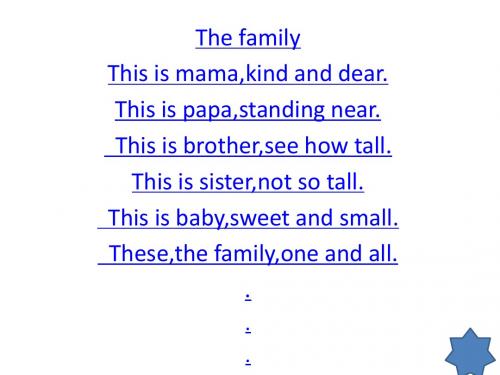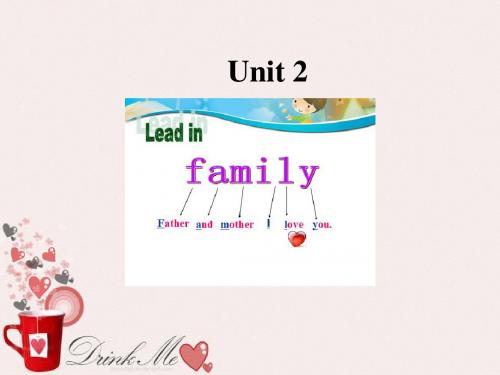- 1、下载文档前请自行甄别文档内容的完整性,平台不提供额外的编辑、内容补充、找答案等附加服务。
- 2、"仅部分预览"的文档,不可在线预览部分如存在完整性等问题,可反馈申请退款(可完整预览的文档不适用该条件!)。
- 3、如文档侵犯您的权益,请联系客服反馈,我们会尽快为您处理(人工客服工作时间:9:00-18:30)。
are my brothers.
B: Who’s that old man?
A: He’s my grandfather.
2a Listen and circle the words you hear.
parents mother grandparents
father
sister
brother
grandmother grandfather friend
Father and mother
I
love you.
What’s his name?
His name is Xia Yu.
Do you know his family?
sister
father
mother
brother
This is his mother.
This is his father.
These are her parents.
This is her father.
This is her mother.
This is Mary.
This is her grandmother.
This is her grandfather.
These are her grandparents.
注意到了吗? 单数 this that it/he/she is 复数 these those they are
2c Ask and answer questions about the photo in 2b.
Who’re they?
Who’s that boy? Are these your parents?
They’re my grandparents. Yes, they are.
He’s my brother.
Sally/Kate: Thanks! You, too. Bye!
1. Are those your parents? parents是parent的复数形式,表示父 母双亲。parent表示父母双亲中的一 员—father或mother。类似的词还有 grandparent,意为“祖父(母);外 祖父(母)”。
III. 连词成句。
1. my, is, Bill, This, friend, (.)
____________________ This is my friend Bill. 2. parents, these, your, Are, (?) ______________________ Are these your parents? 3. day, a, good, Have, (!)
These are his parents.
That is his grandmother.
That is his grandfather.
Those are his grandparents.
This is his friend.
These are his friends.
注意:在英语表达中,不管是 “妈妈的 爸爸”还是“爸爸的爸爸”,都是 grandfather, 不像汉语中做“姥 爷”和“爷爷”的区别。同样,英 语 中的grandmother既指“姥姥”也指 “奶奶”。brother和sister 则可以表示哥哥或弟弟,姐姐或
注意: 对话中使用了this和that, 两个及以 上则用these和those。这些统称为指 示代词,指示代词是用来指示或标 识人或事物的代词。 this和these指代离说话人较近的人 或物,that和those指代离说话人较 较远的人或物。these是this的复数 形式,those是that的复数形式。
祝你过个愉快的周末!
—Thanks. You, too.
谢谢!也祝你周末愉快!
—Have a good holiday! 祝你假期愉快!
—Thank you. 谢谢!
4. This is my friend Jane. This is …/That is … 这是……/那是…… This is… 意为“这是……”(指离说话 人较近的人或物),that is …意为“那 是……”(离说话人较远的人或物)是 一个用来介绍他人的常用句型。当介绍 在场在第三人时,常用句型This is… / That is…,一般不直接说He is...或She is...。
2d Role-play the conversation. Sally: Good morning, Jane.
Jane: Good morning, Sally.
Sally: Oh, Jane, this is my sister Kate.
Kate, this is my friend Jane.
1. Remember the new words. 2. Try to introduce your family to your friend orally. This is… That is… He’s… She’s… These are… Those are…
Talk about the family photo.
Read the dialogue in 2d and fill in the blanks.
Those are Kate’s ( parents 凯特的) _______.
That’s _____. Paul
She’s _____. Kate
This is Sally.
This is Jane. ______
Listen for the third time and answer some questions.
1. What’s Cindy’s mother’s name? Jenny. 2. What’s her father’s name? Tom. 3. Is Mary her sister? Yes, it is.
Kate: Nice to meet you, Jane.
Jane: Nice to meet you, too.
Are those your parents?
Kate: Yes, they are.
Jane: And who’s he?
Sally: He’s my brother, Paul.
Jane: Oh, I see. Well, have a good day!
1b Listen and circle the words with the people in the picture. 1. mother 2. father 3. parents 4. brothers 5. grandmother 6. grandfather 7. friend 8. grandparents 9. sister
2b Listen again. Match the names with the people in the picture.
1. Jenny ____ d 4. Bob ____ b
c 2. Jack ____ 3. Tom _____ a 5. Linda ____ 6. Mary ____ e f
呼词不如汉语的称呼词意思明确,应视具
体情况而定。类似的单词还有sister “姐;
妹”, aunt “姑(姨、伯、婶、舅)母”,
uncle “舅(叔、伯、姑)父;姨夫”,
cousin “堂兄(弟、姊、妹);y father’s brother. He’s my uncle. 贝尔是我父亲的兄弟,他是我的叔叔(伯 父)。 Linda is my aunt’s daughter. She’s my cousin. 琳达是我姨的女儿。她是我的表姐(妹)。
3. —Are these your grandparents? —Yes, _____ are. A. these B. they C. those
4. —_______ that boy?
—He’s my friend Jack.
A. Is
B. What’s C. Who’s
5. Look! That’s my _______. Those are my parents. A. family B. brothers C. friends
—Is this your grandmother?
这是你的外婆吗?
—Yes, she is. 是的。
I. 单项选择。 1. —Is that your sister Anna? —No, ______ isn’t. A. it B. she C. he 2. My aunt Alice and my mother are _________. A. sisters B. brother C. brothers
_______________ Have a good day!
4. are, grandparents, Those, his, (.)
_________________________ Those are his grandparents. 5. is, she, Who, (?) __________________ Who is she?
3. Well, have a good day! 祝你过得愉快! Have a good day!(=Have a nice day!)是
一句祝福的话语,意为“祝你过得愉
快”。经常用于谈话或打电话结束时
向对方表示祝福,对方常会回答
“You, too.”,意为“也祝你过得愉
快”。
例如:
—Have a nice weekend!
1c Role-play the conversation in 1a. Then talk about the other people in the picture.





